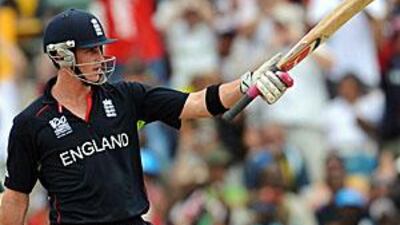Graeme Smith said it all when he stated: "We know better than anyone, it's not how you start, it's how you finish." The South Africa captain was reflecting on how his side stuttered through the early phase of the World Twenty20. And, come Sunday night, there were some sizeable South African fingerprints on the trophy. For once, they had got it right at the business end of a major tournament.
The pity for Smith and his compatriots was the fact that three of their most outstanding players had opted to do it wearing the blue of England instead. And it hardly stops at Michael Lumb, Kevin Pietersen and Craig Kieswetter, the resident South Africans who powered England's unlikely ascent to become world champions. English cricket - indeed, English sport - is awash with players who have migrated north in search of a living, and who have ended up making it all the way into the national team.
Ironically enough, three players who could have been considered next in line for the England squad - Andrew Strauss, Matt Prior and Jonathan Trott - were all born in South Africa, too. As they coasted towards victory in Barbados, Nasser Hussain wondered aloud whether his fellow commentator Ian Bishop felt it mattered that England's matchwinners were not exactly English. Not a jot, was the gist of Bishop's reply.
It seemed a touch ironic that Hussain should even query it. For all of his own international career, Hussain railed against the idea that representing England should mean anything less to him just because he was born in India, to Indian parents. So, does nationality matter? "Ever since I first started in cricket this argument has gone on and it always will do," says Colin Wells, the UAE cricket coach.
"As far as I'm concerned, the sporting bodies that be, in whatever the sport, put down their qualification criteria and if a player reaches the qualification standard, they are eligible to play. "In a broader sense, I'm not convinced of how many young players have ever been stopped playing their sport, who would have gone on to play for their country. There would probably have been some. "Those that do come through and play in their domestic competitions are playing at a much higher standard, because they are playing against better players."
Wells played first-class cricket in England, for whom he played two one-day internationals, as well as in South Africa, for Border and Western Province. Even during his playing days, there were many South African players plying their trade in county cricket. However, the social climate was far different back then. With South Africa still in sporting isolation because of apartheid, the only route their players had to international cricket was by qualifying for someone else. Kepler Wessels went to Australia, while the likes of Allan Lamb and the Smith brothers, Robin and Chris, made it with England.
But South Africa have been back at cricket's top table for nearly 20 years - so why has the exodus continued? The pursuit of a living is the most likely explanation. "There is much more professional cricket in England than there is in South Africa," adds Wells. "They are merely seeking to fulfil their profession." When Pietersen left his homeland, he claimed his decision was based on the fact transition - and the methods administrators in South Africa used to try to hasten the Africanisation of sports - was not giving him a fair chance.
Some doubted the validity of that explanation. Shaun Pollock, the former South Africa captain who tried to talk Pietersen out of leaving, later said he thought the financial lure was certainly part of his reason for departing. "Whether Pietersen did that so he could qualify to play for England, or whether he did that to earn his living, nobody will ever really know," says Richard Harris, the chairman of Abu Dhabi Harlequins rugby club, who went to the same school as Graeme Smith in Johannesburg.
He doubts whether Pietersen or Kieswetter, or Mike Catt or Clyde Rathbone in rugby, actually packed their bags expecting to go on to play for their new country. "A lot of movement is because they can go and earn English pounds, or the Japanese yen in rugby, and it is stronger than the rand," he adds. "Then I think it evolves. It is a sequence of events which allows them to play for England, rather than an isolated decision to say, 'I'm leaving here and in three-years time I will play for England'.
"If they follow the ICC or IRB guidelines, then good for them. But the start of the process, at day one of year one, there is no guarantee they will be good enough. "Living here and working, as we do in rugby, with a three-year qualification rule, then I think if you have qualified to play for this country, and that is your choice, then so be it. "They are selected on merit. Kieswetter was seen as the best T20 opener at this particular moment - that is why he is there. The fact he was born in South Africa, and has earned the right to play for England, so be it." @Email:pradley@thenational.ae


